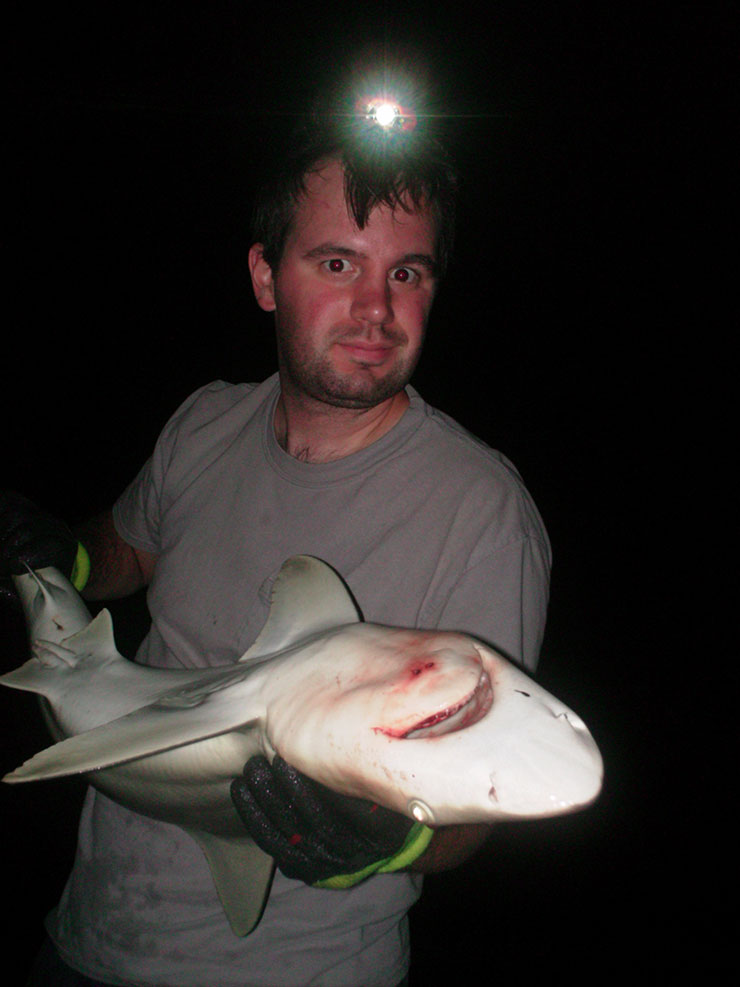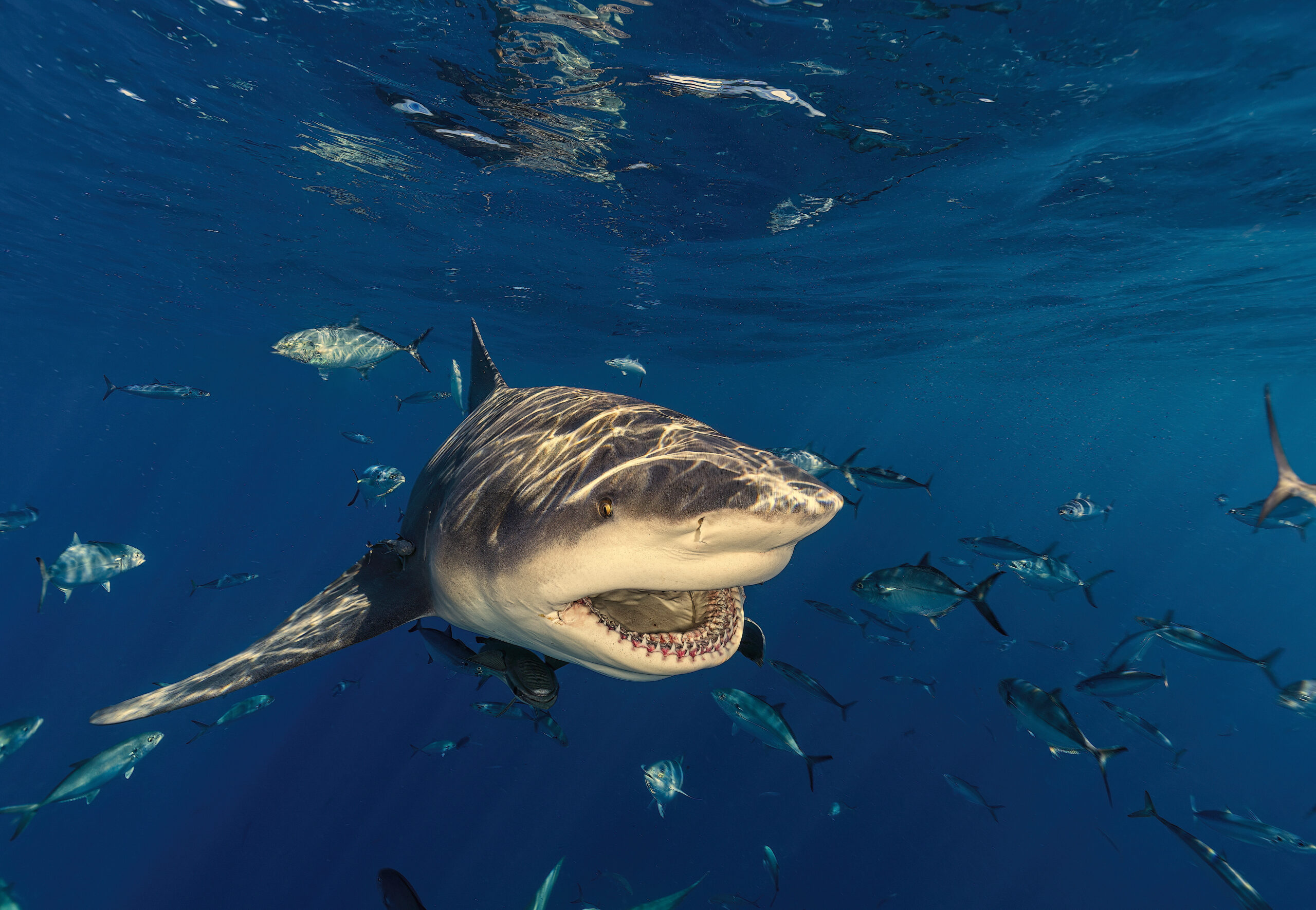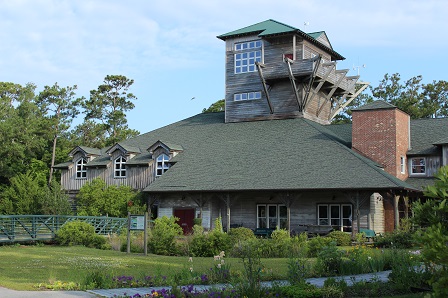The Rulifson lab at East Carolina University has been involved in shark research since 1996, most of which has been supported by North Carolina Sea Grant. After being approached by commercial fishermen interested in the then-developing fishery for spiny dogfish sharks in North Carolina, Roger Rulifson, graduate student Tina Moore, and commercial fisherman Chris Hickman conducted the first of many N.C. Fishery Resource Grant-funded projects on the demographics, stock structure and migration behavior of spiny dogfish overwintering off North Carolina. From 1997 to 2000, they tagged and collected basic biological information from dogfish, data that proved vital when the fishery collapsed in 1998.

Also in 1998, an FRG-funded collaboration with fisherman Edward Newman documented large groups of spiny dogfish in ocean waters south of Cape Hatteras. This was noteworthy because these sharks were outside of the area covered by National Marine Fisheries Service bottom-trawl surveys that were used to estimate the dogfish population. Further work with Newman and Hickman would prove even more helpful to dogfish management. A 2004 FRG-funded study on spiny dogfish capture mortality showed that these sharks were much more resilient than previously assumed, able to survive and recover from capture by both gillnets and bottom trawls.
Tagging studies continued in 2005 with graduate student Kelly Register, who produced three different population estimates for the overwintering population. The data suggested that as much as two-thirds of U.S. East Coast spiny dogfish stock migrated into North Carolina coastal waters for the winter. This was the first attempt to quantify the number of dogfish migrating south of Hatteras.
To ground truth these estimates and further inform management decisions, the Rulifson lab revisited spiny dogfish and gillnets. In 2009, the FRG funded a study that partnered graduate student Garry Wright with commercial fisherman Dewey Hemilright to conduct two different experiments.
The first used captive dogfish in an enclosed pen to estimate the number of dogfish in a given area that are caught in a gillnet set. This method provided an idea of how many dogfish a gillnet set might “miss.” The second experiment used vertical gillnets to sample the entire water column and determine spiny dogfish depth preferences. The results suggested spiny dogfish spend more time higher in the water column than previously thought.
After a decade of dogfish research in North Carolina, in 2007 the Rulifson lab, with Sea Grant support, hosted a symposium at ECU. Experts from across the state, the East Coast and both coasts of Canada gathered to compare notes on spiny dogfish fishery management. This meeting resulted in a white paper that synthesized then-current knowledge of spiny dogfish biology, and prompted a shift from traditional mark-and-recapture tagging studies to acoustic telemetry.
Headed by doctoral student Jennifer Cudney, the Hatteras acoustic array was developed and deployed in 2008 thanks to FRG funding and support from the U.S. Fish and Wildlife Service. This vital piece of equipment has been a cornerstone of shark research in the Rulifson lab ever since. It has proven useful to other researchers conducting acoustic telemetry studies along the East Coast on species as diverse as Atlantic sturgeon, green sea turtles and great white sharks.
After deployment of the array, Cudney used a combination of active and passive telemetry to describe the movements of North Carolina’s spiny dogfish. Concurrently, doctoral student Andrea Dell’Apa received FRG funding in 2011 to follow up on observations made by Outer Banks fishermen that hinted at a potential spiny dogfish nursery area near Ocracoke. Again working with Hickman, Dell’Apa attempted to find and deploy acoustic tags on juvenile dogfish.
Chuck Bangley, another doctoral student, followed up on his master’s work on spiny dogfish feeding habits with a 2012 FRG study in collaboration with fisherman Tom Roller. In this study, Bangley, used feeding trials on captive dogfish to determine the average daily ration for these supposedly voracious sharks.
Starting in 2012, the Rulifson lab expanded telemetry and survey efforts to include other coastal shark species. In the summer of 2012, Bangley, supported by a minigrant from Sea Grant, conducted a gillnet and longline survey to find juvenile coastal sharks within Pamlico Sound. Though no sharks were found, the survey did find evidence of a potential cownose ray nursery.
Bangley has had better luck finding juvenile sharks in ocean waters after taking over Cape Hatteras acoustic tagging efforts from Dell’Apa. Sandbar and dusky sharks now are included among the species tracked by the Rulifson lab.
This article was published in the Winter 2014 issue of Coastwatch.
For contact information and reprint requests, visit ncseagrant.ncsu.edu/coastwatch/contact/.
- Categories:



